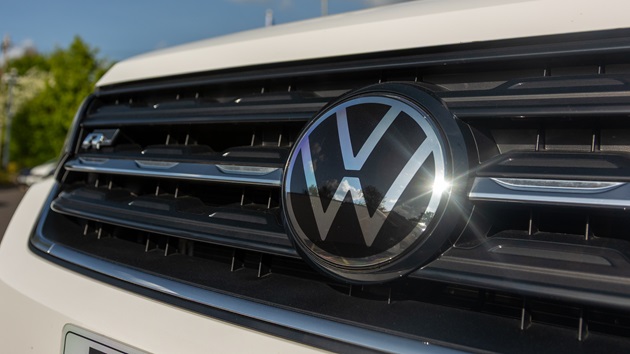
(NEW YORK) — President Donald Trump’s tariffs cost German auto giant Volkswagen about $1.5 billion over the first half of 2025, the company said on Friday.
Sales in North America plunged 16% due primarily to U.S. tariffs, said Volkswagen, which owns a host of brands including Audi, Lamborghini and Porsche.
The company warned of further “challenges” that will arise from “an environment of political uncertainty, expanding trade restrictions and geopolitical tensions,” among other factors.
Volkswagen marks the latest in a string of major carmakers to announce billions in tariff-related losses.
General Motors on Tuesday said tariffs on cars and auto parts drove $1.1 billion in losses over three months ending in June. A day earlier, Jeep maker Stellantis said it expects to have suffered $2.7 billion in losses over the first half of 2025 due in part to U.S. tariffs.
Electric-vehicle maker Tesla this week reported a roughly $3 billion drop in revenue over three months ending in June when compared to the same period a year earlier.
In a statement on Wednesday, Tesla touted a “strong balance sheet” but acknowledged a “sustained uncertain macroeconomic environment resulting from shifting tariffs.”
Tariffs of 25% on vehicles imported into the United States went into effect on April 2. The auto tariffs, which apply to cars and auto parts, threaten to raise costs for carmakers that often oversee an intricate supply chain snaked between the U.S., Mexico, Canada and beyond.
In a memo in March, the White House touted auto tariffs as a means of bolstering domestic car manufacturers and protecting an industry viewed as important to U.S. national security.
The policy, the White House said, will “protect and strengthen the U.S. automotive sector.”
Volkswagen currently faces total US tariffs of 27.5%, the company said, combining the recent 25% auto tariff on top of preexisting 2.5% tariffs.
The company said it expects a worst-case scenario of current tariff levels over the second half of 2025, while in a best-case scenario tariffs could be reduced to 10%.
“There is high uncertainty about further developments with regard to the tariffs, their impact and any reciprocal effects,” Volkswagen said.
A trade agreement struck between the U.S. and Japan this week dropped auto tariffs from the universal level of 25% to 15%, putting foreign carmakers in other countries at a disadvantage.
The U.S. and European Union are near a deal that would also bring tariffs on European goods down to 15%, the Financial Times reported this week. Trump has threatened to raise tariffs on the EU to 30% on Aug.
1, unless the two sides reach a trade agreement.
Despite rising tariff-related costs for automakers, price hikes for new cars have remained low.
Car prices rose 0.6% in June compared to a year earlier, registering well below the overall inflation rate of 2.7%.
In general, tariff-induced inflation has fallen short of economists’ fears in part because companies stockpiled products before the tariffs took effect, allowing them to temporarily avert the higher cost of importing goods, analysts previously told ABC News.
Copyright © 2025, ABC Audio. All rights reserved.




